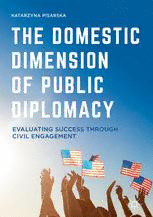
The Domestic Dimension of Public Diplomacy: Evaluating Success through Civil Engagement PDF
Preview The Domestic Dimension of Public Diplomacy: Evaluating Success through Civil Engagement
KATARZYNA PISARSKA T H E D O M EST I C D I M E N S I O N O F P U B LI C D I P LO MAC Y EVALUATING SUCCESS THROUGH CIVIL ENGAGEMENT The Domestic Dimension of Public Diplomacy Katarzyna P isarska The Domestic Dimension of Public Diplomacy Evaluating Success through Civil Engagement Katarzyna Pisarska Warsaw School of Economics Poland ISBN 978-1-137-54678-4 ISBN 978-1-137-54679-1 (eBook) DOI 10.1057/978-1-137-54679-1 Library of Congress Control Number: 2016952809 © The Editor(s) (if applicable) and The Author(s) 2 016 The author(s) has/have asserted their right(s) to be identifi ed as the author(s) of this work in accordance with the Copyright, Designs and Patents Act 1988. This work is subject to copyright. All rights are solely and exclusively licensed by the Publisher, whether the whole or part of the material is concerned, specifi cally the rights of translation, reprinting, reuse of illustrations, recitation, broadcasting, reproduction on microfi lms or in any other physical way, and transmission or information storage and retrieval, electronic adaptation, computer software, or by similar or dissimilar methodology now known or hereafter developed. The use of general descriptive names, registered names, trademarks, service marks, etc. in this publication does not imply, even in the absence of a specifi c statement, that such names are exempt from the relevant protective laws and regulations and therefore free for general use. The publisher, the authors and the editors are safe to assume that the advice and information in this book are believed to be true and accurate at the date of publication. Neither the pub- lisher nor the authors or the editors give a warranty, express or implied, with respect to the material contained herein or for any errors or omissions that may have been made. Cover Illustration: © Denys Kovtun / Alamy Stock Photo Printed on acid-free paper This Palgrave Macmillan imprint is published by Springer Nature The registered company is Macmillan Publishers Ltd. London. To my friend, partner and husband, Zbigniew P REFACE My academic interest in public diplomacy comes primarily from my pro- fessional practice. For over a decade now I have been running one of the fi rst not-for-profi t, non-governmental diplomatic academies in Europe: the European Academy of Diplomacy (EAD) in Warsaw. Throughout the years of its development from a small, student start-up into an inter- nationally recognized institution, there have been many lessons I have acquired. One which stands out, however, is that the most life-changing experiences, that deeply infl uence our perceptions of other nations and cultures, come from direct people-to-people contacts. These contacts are most credible when organized outside of the realm of government and with genuine grassroot support of civil society in both hosting and sending countries. Having seen hundreds of EAD international Alumni continuing to work with Poland after they returned home, I could not help but wonder whether governments understand the intrinsic value that such non-governmental initiatives have for a country’s reputation abroad? And if they do acknowledge such projects as part of the country’s pub- lic diplomacy effort, what are the best practices of cooperation between the domestic civil society actors and Ministries of Foreign Affairs? Finally, how can such cooperation move beyond “NGOs as contractors” para- digm into real dialogue and partnership where inspiration and infl uence work both ways and where non-governmental organizations (NGOs) are treated as independent public diplomacy actors? During my time as a Visiting Scholar in Washington, DC, in 2010, I presented all these ques- tions to a local partner institution, with whom we were operating a joint Polish–American youth exchange, sponsored by the US Government. vii viii PREFACE The answers I received were fascinating and made me want to fi nd out more about the value of civil engagement in foreign policy practice. Other interviews soon followed. At that time, I would not have expected that this journey would take me to three different continents, allow me to interview over 80 public diplomacy practitioners and experts and fi nally inspire me to write this book. K atarzyna Pisarska Mazowieckie, Poland A CKNOWLEDGMENTS This book is the culmination of several years of hard work and would not have been written without the assistance of many different individuals and institutions. First, I gratefully acknowledge the support and guid- ance of Professor Joachim Osiński and Professor Piotr Ostaszewski, from my home institution, the Collegium Of Socio-Economics at the Warsaw School of Economics. The Collegium has provided me with the much- needed creative space for scientifi c inquiry as well as fi nancial support for different stages of this study. Second, I express my warm thanks to the three institutions that have accepted me as a Visiting Scholar and provided the infrastructure and environment for research and interviewing. These were the Center for Transatlantic Relations at Johns Hopkins School of Advanced International Studies in Washington, DC, directed by Professor Dan Hamilton; the Department of Political Studies at the University of Oslo represented by Professor Jostein Rosfjord Askim; and the Center for European Studies at the Australian National University in Canberra led by Professor Jacqueline Lo. I would like to acknowledge that my three-month fellowship in Australia was generously supported by the Go8 Group, which granted me a full scholarship for the duration of my stay “Down Under.” I would like to thank all the research participants of this study. In the years 2011–2015, I was fortunate to meet and speak to over 80 inspir- ing individuals—diplomats and representatives of various NGOs from Norway, Australia and the USA. I am grateful for their time, effort and critical insights which form the backbone of this book. I also thank Professor Giles Scott-Smith, Professor Alan Hendrikson as well as s everal ix
